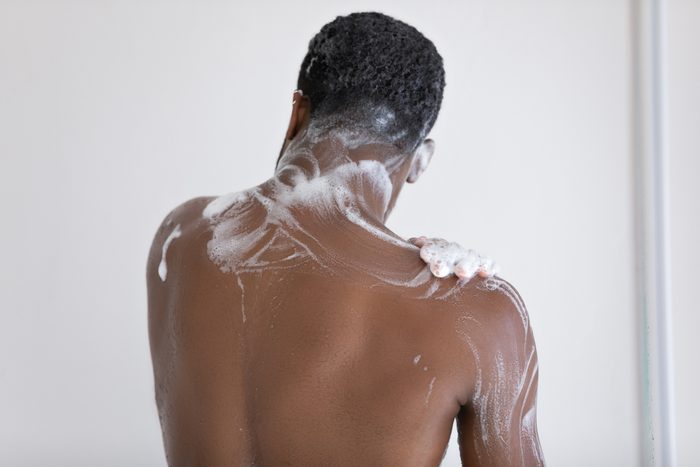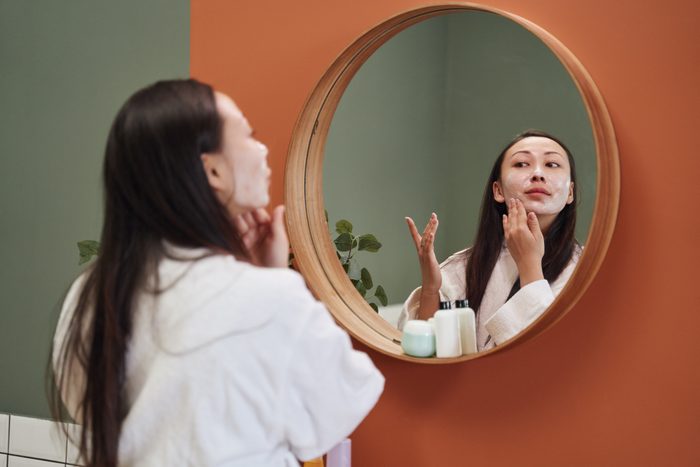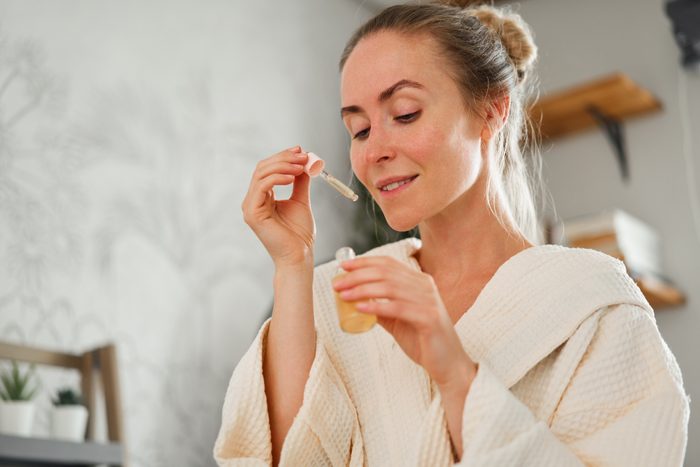
Why do you need a specific summer skincare routine?
Some dermatologists say that just as your wardrobe changes between seasons, your skincare lineup should, too. “For most every skin type, skin has different needs depending on the weather you’re in,” Lisa Pfingstler, MD, a board-certified dermatologist in DuBois, PA, tells The Healthy @Reader’s Digest. This is perhaps true for summer in particular, as research published in the journal Science tells us that sunlight-induced skin damage can continue for hours after we’ve gone back indoors. That means summer skin needs some extra TLC.
So whenever you spend time outdoors this summer, here’s the post-sun skincare routine experts recommend to give your skin some extra TLC—and a boost of protection.
Miranda Kerr Just Shared Her 4 Secrets for Gorgeous Skin, Low Inflammation, and Better Digestion

Cleanse gently
Hadley King, MD, a board-certified dermatologist in New York, recommends ending the day by using a gentle cleanser. That’s not only to wash off sunscreen, makeup and sweat—in fact, as another board-certified dermatologist, Rebecca Marcus, MD, says, “After skin has been exposed to the sun, especially too much sun, an inflammatory response takes place.” This inflammation is what kick-starts the healing process after sun exposure causes damage or death to the skin cells. However, that same inflammation can trigger skin sensitivity, as well.
In particular, Dr. Marcus says she likes Dove Beauty Bar or Dove Body Wash, as both are free from harsh detergents that strip the skin, while simultaneously moisturizing to support your skin barrier.
Get The Healthy @Reader’s Digest newsletter for skin and total wellness wisdom delivered daily

Moisturize dehydrated skin
Sun exposure dehydrates the skin and depletes its essential fatty acids—the building blocks of healthy cells that keep our skin plump and firm. “Hydration is key for skin healing,” Dr. Marcus says, “so apply as much moisturizer as reasonably possible, as often as possible.”
These Are the Best Facial Moisturizers For Your Skin Type
Here are three features to look for in a post-sun moisturizer:
Humectants
What’s a humectant? A humectant is an ingredient that attracts moisture from the air and draws it into the skin. Dr. Marcus points to hyaluronic acid (HA) as an all-star humectant that can hold almost 1,000 times its weight in moisture. Research published in Wounds added that HA speeds up skin healing, tissue repair, and inflammation relief—a trifecta for handling an accidental sunburn.
Emollients
Maybe you’ve heard of emollients. Dr. King says emollients act as skin softeners and smoothers, working to support your skin barrier. This outermost layer of your skin is your body’s protective shield that maintains your body’s hydration balance. But sun exposure can break it down, inviting dryness, redness, inflammation, skin sensitivity, and even breakouts.
Ultra-hydrating emollients you’ll often encounter include plant-based oils (like jojoba, coconut, almond, and squalene) and lipids called ceramides. Still, for an extra-protective punch, you can opt for plant butters like shea butter, sesame butter, or avocado butter, says Tammy Fender, an aesthetician in Florida. “[These all] contain vitamin E and antioxidants, which can give added protection to the skin.”
Occlusives
Occlusives are ingredients that act as a protective seal to lock in moisture, Dr. King explains. Petroleum jelly is one of the most common occlusives—but experts say that while it’s great for helping to rehydrate sun-worn skin, avoid using it (or other thick occlusives) on a full-blown sunburn because it can trap heat and slow healing.

Repair UV wear-and-tear
Moisturizing is key to refreshing and rejuvenating sun-kissed skin. But because sun damage can carry on hours after you’re undercover, some extra attention can help keep its effects at bay. That’s why you shouldn’t miss this step in your post-sun skincare routine.
One Major Effect of Blue Light on Your Skin, Says Research
Soothe with anti-inflammatories
Anti-inflammatory ingredients can also be helpful to soothe skin after sun exposure, Dr. Marcus explains. She points to niacinamide, a form of vitamin B3 that can reduce inflammation, speed up skin healing, seal in moisture, and slow pigmentation. Plus, research published in Experimental Dermatology showed that niacinamide can protect skin cells from UV damage—as well as accelerate DNA repair.
Another seriously soothing anti-inflammatory ingredient, says Dr. King.
If you do end the day with a sunburn, Dr. Marcus says another trick is to apply hydrocortisone. “Even the over-the-counter version can be helpful in quickly decreasing inflammation and discomfort associated with sunburn,” she says. “If you have a bad sunburn, though, you may need to see your dermatologist, who can prescribe a stronger topical steroid if needed.”
Fortify with vitamin C
“Sun exposure stimulates melanocytes, which are the pigment-producing cells in skin,” Dr. Marcus explains. But certain ingredients can block this process, such as vitamin C. She says one form in particular—vitamin C 3-0 ethyl ascorbic acid—is particularly potent and has been shown to prevent and treat sun-induced hyperpigmentation. Research from the Journal of the American Academy of Dermatology also suggested that vitamin C (especially when combined with vitamin E) works to increase your SPF protection.
Dermatology Pros Just Listed Their 6 Favorite Vitamin C Serums
Restore with DNA repair enzymes
Dr. King recommends using products containing DNA repair enzymes after sun exposure, as well. DNA repair enzymes occur naturally in the body, while skincare products include enzymes from sources like plankton and plants. And research published in Clinical, Cosmetic, and Investigational Dermatology found that these ingredients can accelerate the recovery of DNA damaged by UV radiation, reducing signs of premature aging and the risk of skin cancer.
Look for products that contain photolyase (derived from plankton) or UV endonuclease (derived from certain good bacteria).
Avoid irritants
While your skin is on the mend from a day in the sun, you’ll want to steer clear of any products that can worsen inflammation and irritation. So, shelve your exfoliants, acids (like salicylic, glycolic, or lactic), retinoids, and alcohol-based toners until your skin heals.
